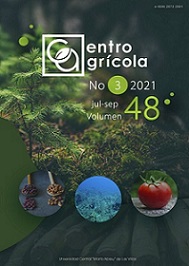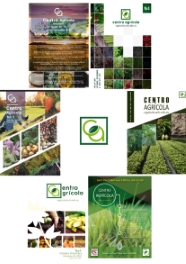CE:3117 CF: cag103172139
RESEARCH ARTICLE
Efficacy of six fungicides in the control of Mycosphaerella citri Whiteside in orange cv. ‘Valencia’ in Tlayecac, Morelos, Mexico
Eficacia de seis fungicidas en el control de Mycosphaerella citri Whiteside en naranja, Var. ‘Valencia’ en Tlayecac, Morelos, México
Dagoberto Guillén Sánchez1 , Ricardo Hernández Perez2 , María Andrade Rodríguez3 , Víctor López Martínez3 , Irán Alia Tejacal3 y Porfirio Juárez López3
1 Universidad Autónoma del Estado de Morelos, Escuela de Estudios Superiores de Xalostoc. Av. Nicolás Bravo s/n, Parque Industrial Cuautla, Xalostoc, Ciudad Ayala, Morelos, México. CP 62740
2 Asesor Científico. Fitolab S.A de C.V. Puxtla, Cuautla. Morelos. México. CP 62758
3 Universidad Autónoma del Estado de Morelos, Facultad de Ciencias Agropecuarias. Av. Universidad 1001, Colonia Chamilpa, Cuernavaca, Morelos, México. CP 62209
E-mail: This email address is being protected from spambots. You need JavaScript enabled to view it.; This email address is being protected from spambots. You need JavaScript enabled to view it.
ABSTRACT
The efficacy of six fungicides for the control greasy spot (Mycosphaerella citri Whiteside) in orange (Citrus sinensis (L.) Osbeck) cv. ‘Valencia’ was evaluated in plots with a randomized block design and six treatments: (Azoxystrobin + Difenoconazole), Flutriafol, Difenoconazole, Benomyl, Copper Oxychloride, Trifloxyistrobin and a control. Three spraying, were made, every fifteen days. During the assay, the incidence, severity and efficacy of the diseases were evaluated. In addition, area under the disease-progress curve (AUDPC) and disease-progress curve relative in percent (AUDPCr) were calculated. The data were processed through a simple ANOVA. As results, the incidence remained unchanged up to 21 days after treatment (DAT), with low values between 1,3 and 5 %, which increased from 28 (DAT) (58-96 %). The initially severity was low (0,1-3 %) and was increased up to 32 %. The efficacy 7 (DAT) had the highest percentages with Benomyl and Trifloxyistrobin (87,5 %) and Difenoconazole (75 %). While at 14 (DAT) Difenoconazole and Azoxydifem reached 87,5 %. All fungicides reduced the area under the disease-progress curve (AUDPC) in relation to the control and in correspondence the lowest cumulative relative percentages of disease-progress curve relative in percent (AUDPCr) were obtained by Flutriafol, Benomyl and Trifloxystrobin (8.4, 8.6 and 8.7 %), although without statistical differences with another fungicide, only with the control (11.2 %).





